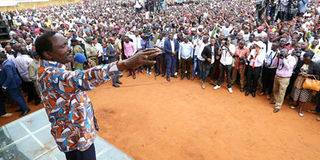Inclusivity marketed at BBI rallies does not match public expectation

Wiper party leader Kalonzo Musyoka addresses a Building Bridges Initiative in Kitui on February 1, 2020. PHOTO | DENNIS KAVISU
What you need to know:
- Kenya’s politics must be about inclusion; that is, the struggle of Kenyans to be included in the management of their affairs, resources and decision-making.
- Inclusivity is about equitable sharing of economic, political and social opportunities by all regions of Kenya. Yes, there’s a long way to go.
Building Bridges Initiative (BBI) rallies are neither informative nor educative on inclusivity.
Yet inclusivity is the byword for the current clamour for change and panacea for the disparities bedevilling the land.
Still, BBI principals, President Kenyatta and ODM leader Raila Odinga, have an opportunity to set Kenya on the road to the society President Kibaki envisioned in the well-thought-out, but now forgotten, Vision 2030:
“ … to transform Kenya into a newly industrialising, middle-income country providing a high quality of life to all its citizens by 2030 in a clean and secure environment.” [the emphasis is mine]
Leaders and the visions that they shape or are thrust upon them come and go.
But the struggle of the mass of Kenyans to earn a decent living; build decent livelihoods; make the lives of their children better; and leave a legacy of decent achievement is everlasting.
GOOD MANAGEMENT
But the centrality of politics, and, therefore, government to the success or failure of this perpetual struggle cannot be gainsaid.
Herewith former President Moi, the self-declared professor of politics:
“Siasa mzuri, maisha mzuri; siasa mbaya, maisha mbaya (decent politics makes for decent life and flawed politics begets indecent life).”
However, the constitutional dictatorship he ran could not qualify as decent politics.
Former British premier Theresa May put it aptly: “politics is not a game……(Cabinet) decisions affect day-to-day lives and we must do the right thing and make the right decisions.”
Kenya’s politics will be serious business when it centres on management of the country’s resources and the discrimination, marginalisation and exclusion that ensue from their skewed distribution and application.
Kenya’s politics must be about inclusion; that is, the struggle of Kenyans to be included in the management of their affairs, resources and decision-making.
The colonialists excluded our forebears from the ownership, management and application of Kenya’s resources.
UNITARIST KANU
Our forebears took up arms against exclusion. Fearful the big tribes dominating Kanu would discriminate against them in post-independence Kenya, the smaller communities formed Kadu. Kanu was centralist where Kadu was federalist.
The struggle for devolution was, and must remain, the clamour for inclusion. For it came to pass that unitarist Kanu governments shunned and shunted the regions to the periphery.
It was left to Josiah Mwangi “JM” Kariuki to give expression and an everlasting narrative to what was happening in the first decade of uhuru: Kenya was becoming an enclave of 10 millionaires in a sea of 10 million beggars.
George Anyona would question why a passion fruit factory would not be built in Kisii, which grew the fruit, but in Thika, because it aspired to be an industrial conurbation.
Then, unitarist Kanu became a monopoly. In 1982, Kenya became a single-party state by law. The fight for political pluralism or second liberation through the 80s was about inclusion.
Kanu suspended and expelled at a whim while criminalising thought and expression.
MARGINALISATION
In new politically plural Kenya, the next phase of the struggle for inclusion was the nearly two-decades-long fight for a new Constitution.
In 1992, Kenya had became a multiparty state, but with a single party Constitution.
From 2018, the campaign for a review of the 2010 Constitution has been marked by a clamour for inclusivity.
Rightly so. President Kenyatta, Deputy President William Ruto and the Jubilee Party have run a largely two-tribe government.
President Kibaki returned Kenya’s economy to a brilliant growth trajectory in readiness for Vision 2030.
But he turned a deaf ear and blind eye to the overwhelming dominance of strategic sectors of the public service and economy by one community.
And it was during Mr Kibaki’s tenure that “Pwani Si Kenya” (Coast is not part of Kenya), the clarion call of the secessionist Mombasa Republican Council (MRC), reached a crescendo.
2022 CAMPAIGNS
Secession was the Coast’s weapon of last resort against exclusion from the economic mainstream via denial of land and from the world-famed hospitality and, therefore, lucrative tourist industry.
However, the inclusivity sold at BBI rallies does not tally with the age-old demand explained above.
It amounts to a campaign for executive jobs. Yet inclusivity is about the many and not the few.
Inclusivity is about equitable sharing of economic, political and social opportunities by all regions of Kenya. Yes, there’s a long way to go. A luta continua.





